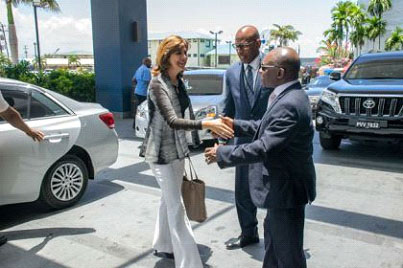More than two decades after the Colombian Embassy was closed here, Georgetown and Bogota over the weekend discussed having one re-established and the prospects look favourable.
“They had economic problems which led to the closure and now they are discussing having a Colombian Embassy here again,” Minister of Foreign Affairs and acting Prime Minister Carl Greenidge told Stabroek News yesterday.
The Colombian Minister of Foreign Affairs, María Angela Holguín, was in Guyana on Saturday for bilateral discussions and Greenidge said that among the range of issues discussed, having an embassy here once again formed part of those talks.
Greenidge said he believes that country has now seen an ideal time to have those discussions restarted and is favourably disposed to having the embassy here soon.
A Colombian embassy here is seen as significant as both Georgetown and Bogota have had long-running border issues with their mutual neighbour, Venezuela. Border problems have also been exacerbated in recent months by the thousands of Vene-zuelans who have streamed into Colombia seeking refuge and jobs or to travel to third countries.
In June of last year, Guyana and Colombia signed an `Agreement on Mutual Exemption of Visas for Holders of Ordinary Passports’, where they agreed that there would be visa free travel between the two states.
Signed on the margins of the 47th Regular Session of the General Assembly of the Organisa-tion of American States in Cancún, Mexico, the Agreement will allow holders of Ordinary Pass-ports to enter and stay in the territories of the two countries without a visa for a period not exceeding ninety days. This period would be renewable for an additional period of up to ninety days, provided that the total length of stay does not exceed 180 days per year.
And with the two countries also sharing a border with Venezuela, where current economic and political issues have seen its citizens fleeing to neighbouring countries, discussions were also had on strengthening relations on border security.
Brentnol Ashley, the Regional Chairman of Region One (Barima-Waini) has bemoaned that the increasing number of Venezuelans is impacting negatively on the border communities. He has said that while the region is willing to provide help it also wants to secure the interests of local residents.
He pointed out that from their observations they have noted that most of the persons who have crossed the Guyana-Venezuela border and have been entering the Barima-Waini region have been seeking treatment for malaria.
Meanwhile, Greenidge also explained that in addition to the re-establishment of an embassy, several other areas were discussed. “We discussed all things… we discussed a very extensive range of bilateral matters such as cooperation agreements including the teaching of Spanish at the University of Guyana and discussions of agriculture development at the Guyana School of Agriculture,” he said.
Trade, countering terrorism and general matters of security were also on the agenda.
Greenidge said that the two sides have always shared an excellent diplomatic relationship and the visit by the Colombian Minister of Foreign Affairs was to foster the strengthening of those ties.





